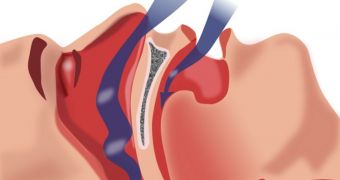Scientists have determined in a new study that children suffering from obstructive sleep apnea (OSA) are more likely to display impaired attention and verbal memory than their peers. Treating apnea was proven to play a direct role in reducing these symptoms.
In fact, treating OSA results in significant improvements in both verbal memory and attention. The condition is known to influence cognition and executive functions in the human brain, researchers say.
The new investigation was carried out by experts at the University of Colorado in Denver (UCD) and the Children’s Hospital Sleep Center. Ann Halbower, MD, who holds an appointment as an associate professor at UCD, coordinated the research.
Details of the results will be presented at the American Thoracic Society 2012 International Conference in San Francisco. The paper is called “Brain Injury And Cognitive Deficits Reverse With Treatment Of Childhood Obstructive Sleep Apnea.”
The investigation was sponsored by the US National Institutes of Health (NIH) and the National Center for Research Resources. The study was carried out on children aged 8 to 11, divided into a study group (those with OSA) and a control group.
“OSA is known to be associated with deficits in attention, cognition, and executive function. Our study is the first to show that treatment of OSA in children can reverse neuronal brain injury, correlated with improvements in attention and verbal memory in these patients,” Halbower says.
All test subjects had their brains scanned with a medical technique called magnetic resonance spectroscopy imaging, PsychCentral reports. A total of 15 OSA patients and 7 healthy controls were investigated, the team says.
Some of the courses of treatment applied to the test group included the removal of tonsils and adenoids via surgery, a procedure called adenotonsillectomy, as well as nasal treatments and monitored continuous positive airway pressure (CPAP).
“We have demonstrated for the first time that treatment of OSA in children normalizes brain metabolites in portions of the neuronal network responsible for attention and executive function,” the team leader explains.
“We speculate that if OSA is treated earlier, there may be a more brisk improvement in the hippocampus, a relay station for executive function, learning, and memory. Our results point to the importance of early diagnosis and treatment of OSA in children, as it could potentially have profound effects on their development,” she concludes.

 14 DAY TRIAL //
14 DAY TRIAL //